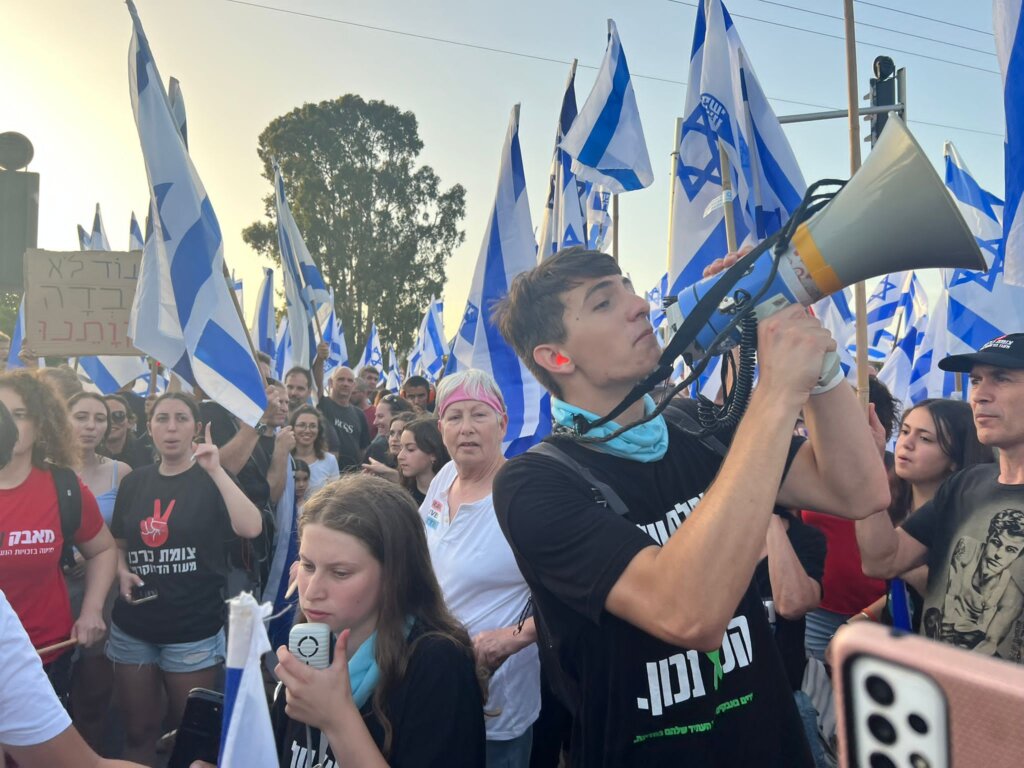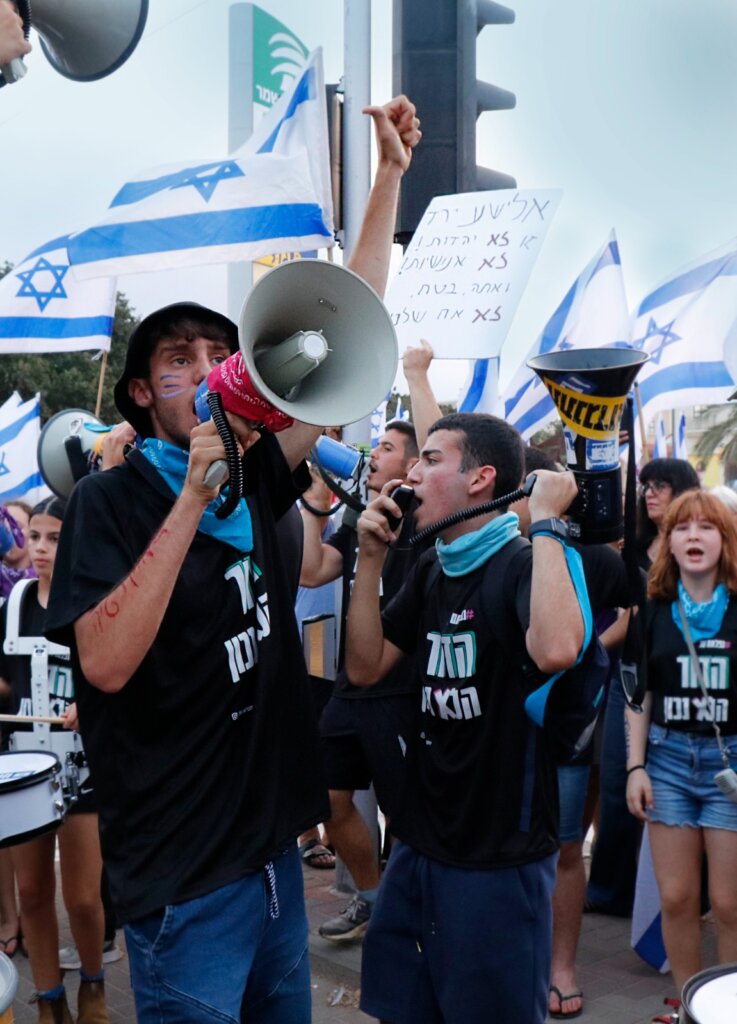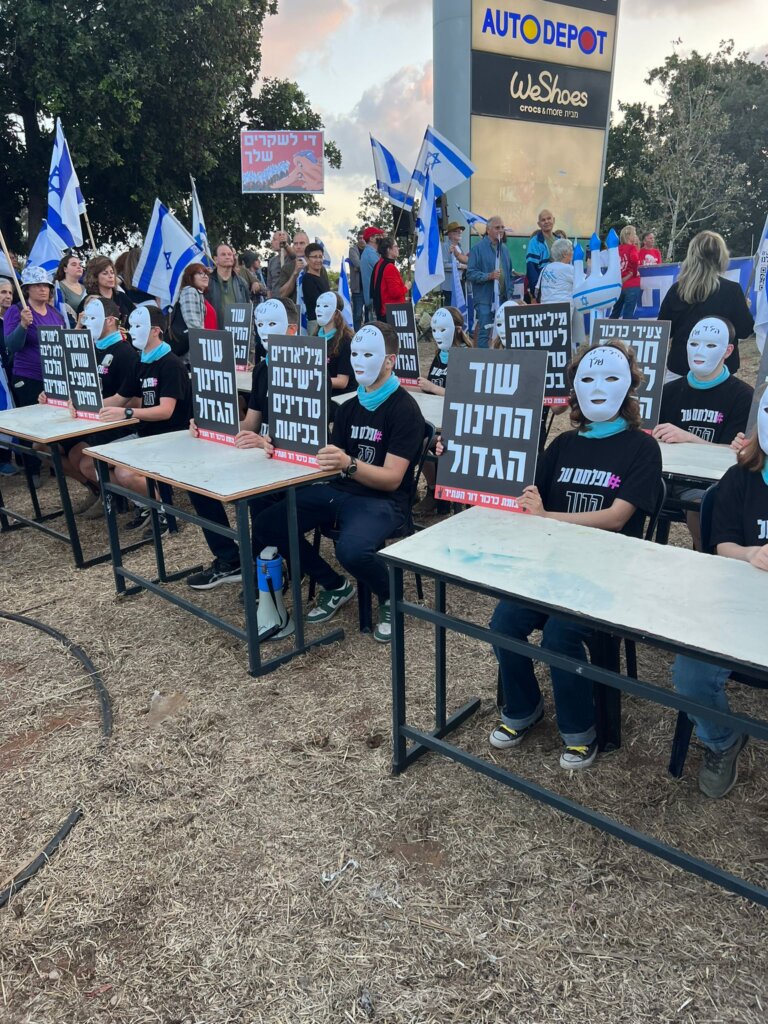‘We don’t have another country’: Two teenage protest leaders question Israel’s future
For young Israelis who oppose the judicial overhaul, the protests feel personal — it’s their future at stake

Graphic by Angelie Zaslavsky
TEL AVIV — Tal and Edo met me at the bus stop in Karkur, a relatively secular and affluent town about halfway between Tel Aviv and Haifa, wearing their protest shirts. “You fell on the wrong generation” the shirts read in Hebrew.

Tal and Edo, ages 18 and 19, lead the group of youth protesters involved in demonstrations against Israel’s government in Karkur, which has a population of 44,000. (Tal and Edo requested to have their last names withheld, out of concern for their safety.) The pair are such well-known leaders at the town’s weekly protests, which regularly draw hundreds of people, that the protesters celebrated Tal’s 18th birthday during one demonstration.
Israelis have been protesting the current government’s stated intention of overhauling the nation’s judicial system for eight months. Protests reached a new height — and got more violent — in July, after the Knesset, Israel’s government, passed a law limiting the Supreme Court’s oversight.
I arrived in early August to report on the situation from the ground, where I met protesters of all ages and backgrounds.

For teenagers like Tal and Edo, and the group of young protesters they lead, the questions of national identity at play feel particularly personal — especially as they stare down the barrel of their required army service.
I learned about Tal and Edo, both of whom are delaying that service for a year, after attending a protest in Neve Ativ, a village in Israel’s remote north where Israel’s prime minister, Benjamin Netanyahu, was vacationing with his wife Sarah.
A few days into the protest, after I left the north to report in Tel Aviv, a contact sent me a video of Tal and Edo. The pair had made a banner renaming the town Neve Radon, or “Abode of the dictator,” which they unfurled with great ceremony over the village’s walls as the assembled protesters banged drums. Older members of the protests urged me to get in touch with them.
“It’s really important for us that our brothers across the ocean hear the voice of this beautiful new generation,” one told me, forwarding their numbers.
So I texted them. A few days later, I took a bus from Tel Aviv to the intersection where the protests occur in Karkur, and the teens walked me to a cafe nearby so we could talk. Both ordered milkshakes. They spoke a mile a minute, constantly interrupting each other. They told me that their friends know they can talk about the protests all night — and often have.
Devoted Zionists, but ashamed of Israel
Over the course of our three-hour conversation in Hebrew, the boys talked at length about their love for Israel — and their fear for its future. Edo choked up when talking about his mixed emotions about his Zionism.
Tal aspires to win the Nobel Prize in biology. But if he does, he wants to be able to be proud when a chorus sings “HaTikvah,” the Israeli national anthem, during the prize ceremony. Right now, he doesn’t think he could be.
That wish — to feel proud of the country they love — is why the pair, who attended the same high school and became close during the protests, have made it their business to go to demonstrations across the country and make sure the young protesters have a chance to hold the megaphone, too. After all, it’s their future they’re fighting for.
“We don’t have another country,” Edo said.
Tal’s parents fled the Ukraine while it was part of the Soviet Union, and Tal himself speaks Hebrew with a notable Russian accent. “My kids will not hear the stories I heard,” he swore; he grew up on his parents’ tales of violent oppression and terrifying police. His parents, scarred by those experiences, worry about him being so visible in the protests each week.
“They’re so afraid it’s already too late,” he said. “They’re so afraid that I’m going to disappear.”
Edo’s parents, on the other hand, often attend the protests with him. His father was born in Belgium and spent his career working for the Jewish Agency, promoting Israel across the world. Edo emphasized that his father didn’t have to care so deeply about Israel; after all, he didn’t grow up there. But he’d chosen it.
Now, both his parents fear for the country they built their lives around. “I will fight so my father will never need to cry again,” Edo said, choking up. “I was so angry to see 64 people” — the number of Knesset members in Netanyahu’s coalition — “destroying the country I love and my mother loves. I was so angry that they made my father cry.”
“It’s the most proud I’ve been, and the most ashamed I’ve been,” Edo said of the protests.
Israel or Iran?
Netanyahu has been a looming figure for the entirety of Tal and Edo’s lives; neither can remember an Israel without him. (He’s been in power so long that “he thinks he’s a king,” they told me.) The pair see the prime minister as empowering ministers who are pushing for changes that would make the country more theocratic: expanding settlements based on religious belief, reducing education requirements for Haredi students and even pushing to segregate public buses by gender. Both repeatedly compared Israel to countries such as Iran, Turkey and Hungary.

“It used to be live and let live,” Tal said of the attitude between different sectors of the population. “Now it’s extremism, and let be extremism.”
Neither Tal nor Edo grew up particularly religious. But they recognize the power of Judaism in the fight for Israel’s identity. At one protest, on the day of a Jewish fast before Tisha B’Av, which marks the fall of the Temple, a man stepped up to the microphone and called on the government to stop dividing the country before they reached another Tisha B’Av. Then he said the blessing to end the fast.
Both teens were impressed by the power of the moment. “Personally I’ve never fasted. But I took part,” Edo said. “We together listened to the shofar.”
But they acknowledge that Israel’s status as a Jewish nation is a complicated one. Both repeatedly referenced the violence in the West Bank, which they called “Judea and Samaria” in Hebrew, as a pressing problem.
They hope that the protests will be a catalyst for the nation — citizens and government officials alike — to begin to dig into Israel’s deeper issues. First, though, they said they need to stop the judicial reforms.
“Para, para,” Edo said, using a Hebrew slang that literally translates to “cow, cow” and basically means: be patient. He thinks that after the protests have run their course, people will be able to settle down to do the hard work of addressing the country’s underlying issues. “After the batteries in the megaphones will die, it will be,” he said.
“We’ll decide the new norms: Racism isn’t accepted, pluralism is a core value,” added Tal. “And then we can start talking about what to do with Judea and Samaria and what it means to be Jewish in a Jewish state.”
















